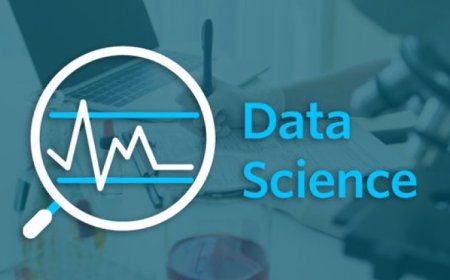How to become a Data Scientist: Embark on Your Data Science Journey
To become a Data Scientist: Learn programming, statistics, and machine learning. Gain practical experience and showcase your skills through projects.

In this data-driven era, where information reigns supreme, the demand for skilled data scientists continues to soar. These analytical wizards possess the power to extract invaluable insights from vast amounts of data, driving innovation and informed decision-making. If you've ever wondered how to embark on this exciting journey yourself, fear not! This blog aims to serve as your friendly guide on the path to becoming a data scientist.
1. Understand the Role
To begin, let's demystify the role of a data scientist. A data scientist is essentially a multidisciplinary expert who combines statistical analysis, programming skills, and domain knowledge to uncover patterns, solve complex problems, and communicate actionable insights. It's important to grasp this multifaceted nature of the job and appreciate the diverse skill set required.
2. Build a Solid Foundation
To succeed as a data scientist, it's essential to have a strong foundation in mathematics, statistics, and computer science. Brush up on your mathematical knowledge, particularly linear algebra and calculus, as they form the backbone of many data science algorithms. Understanding statistical concepts and methods will enable you to draw meaningful conclusions from data. Additionally, learn programming languages such as Python or R, which are widely used in the field.
3. Master Data Wrangling
Data wrangling, also known as data munging, is the process of cleaning, transforming, and preparing data for analysis. It's a crucial step in any data science project, as raw data is rarely in a suitable form for analysis. Familiarize yourself with data manipulation techniques, such as filtering, joining, and reshaping datasets. Tools like pandas in Python or dplyr in R can be immensely helpful in this regard.
4. Dive into Machine Learning
Machine learning is at the heart of data science. It involves the development and application of algorithms that allow computers to learn from data and make predictions or decisions. Explore the various types of machine learning algorithms, such as supervised learning, unsupervised learning, and reinforcement learning. Get hands-on experience by working on projects and experimenting with real-world datasets.
5. Embrace the Art of Visualization
Data visualization is a powerful tool for conveying complex information in a digestible and visually appealing manner. Familiarize yourself with visualization libraries like Matplotlib, Seaborn, or ggplot2, and learn how to create compelling visualizations. Remember, a picture is worth a thousand words, and effective data visualization can enhance the impact of your insights.
6. Hone Your Problem-Solving Skills
Data scientists are problem solvers at their core. Developing a robust problem-solving mindset is essential to excel in this field. Cultivate your ability to break down complex problems into manageable parts, apply analytical thinking, and devise innovative solutions. Practicing on platforms like Kaggle can help sharpen your problem-solving skills and expose you to real-world challenges.
7. Embrace Continuous Learning
The field of data science is ever-evolving, with new techniques, algorithms, and tools emerging regularly. Embrace a lifelong learning mindset, keeping yourself updated with the latest trends and advancements. Engage in online courses, attend workshops, join data science communities, and read books and research papers. Continuous learning is key to staying relevant and expanding your knowledge.
8. Work on Real-world Projects
Theory is important, but hands-on experience is invaluable. Seek opportunities to work on real-world data science projects. It could be through internships, freelance work, or personal projects. Practical experience not only hones your technical skills but also demonstrates your ability to apply your knowledge in real-world scenarios. It also helps build a portfolio that showcases your capabilities to potential employers.
9. Cultivate Communication Skills
Being a successful data scientist goes beyond technical expertise. Effective communication is vital to convey your findings and insights to stakeholders who may not possess a technical background. Practice translating complex concepts into simple, meaningful terms. Develop your storytelling abilities, using visualizations and narratives to effectively communicate your results. Strong communication skills set you apart as a well-rounded data scientist.
10. Network and Collaborate
Building a strong professional network is crucial in any career, and data science is no exception. Attend industry conferences, join online forums, and connect with other data scientists. Collaborate on projects, share knowledge, and learn from peers. Networking can open doors to exciting opportunities, provide mentorship, and help you stay in touch with the pulse of the data science community.
Becoming a data scientist is a journey that requires dedication, continuous learning, and a passion for uncovering insights from data. By understanding the role, building a solid foundation, and gaining practical experience, you can embark on this thrilling career path. Embrace the challenges, learn from failures, and celebrate successes along the way. Remember, the world of data science is ever-expanding, offering endless opportunities for growth and making a meaningful impact. So, let your curiosity guide you, and embark on this exciting adventure!












































